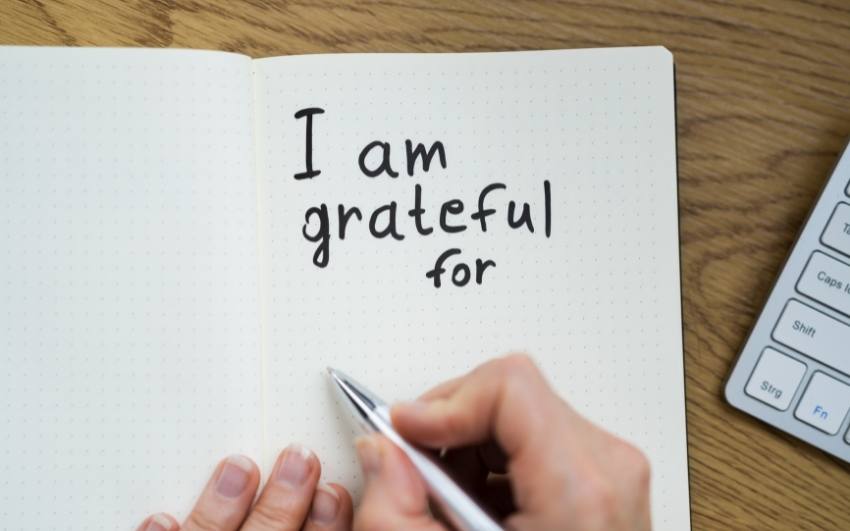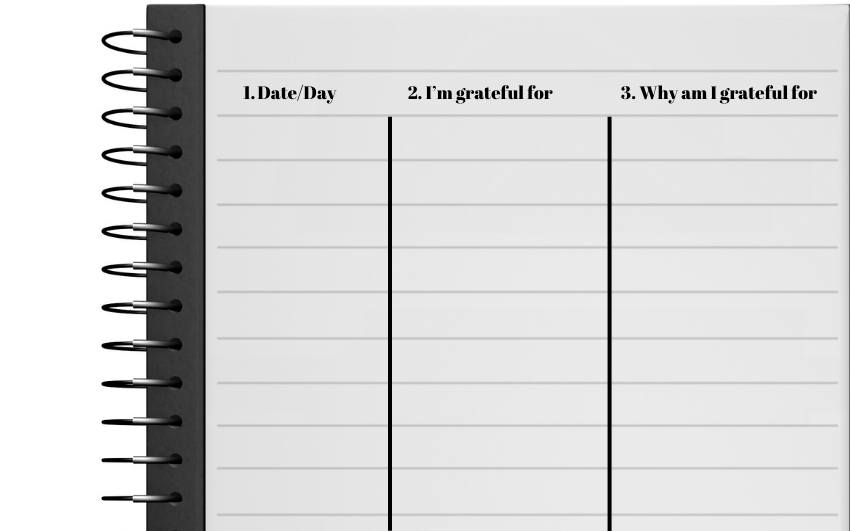On this page

How To Start A Gratitude Journal and Keep It Going
When it comes to practicing gratitude, one of the easiest ways to get started is a gratitude journal.
A journal or gratitude diary, is a place where we record things you’re grateful in our lives, usually in the morning or before sleep.
Gratitude often brings happiness and optimism. It has been proven to improve our mental health and well-being. If you are looking for a way to boost your mood, maintaining a daily gratitude journal could be a great way to do that.
Would you like to know how to get started?
Let’s find out!
What is A Daily Gratitude Journal?

A daily gratitude journal is a notebook where you record things that you are grateful for, each day.
It is also known as a:
- Grateful Journal
- Thankful Journal
- Gratitude Diary
You can record anything that you believe is a great addition to your life. And the most important part, it makes you feel happy and grateful!
It can be anything!
From something major like your health, family, or something much simpler like a good lunch.
There are many benefits associated with maintaining a daily journal.
Benefits like:
- Improved Mental and Physical health
- Life satisfaction
- Better sleep
On top of that, getting started on a journal is very easy! Before we move on, let’s take a quick overview of what is gratitude.
What is Gratitude?
Gratitude journal meaning is the feeling of appreciation for what we have. It is a recognition of the goodness in our lives and an acknowledgment of our fortune.
- When a person expresses gratitude, he considers himself fortunate.
- He feels thankful for the good things in his life.
- Expressing an attitude of gratitude has a huge number of benefits for a person.
Read more: Benefits of gratitude
What is the difference between a Gratitude journal and a Diary?
The time of use for both of them is the same for some people, which is late at night before going to bed. Although they have similarities, they both differ a lot!
- A Daily Gratitude Journal is a notebook where you write things you’re grateful for.
It only includes the good things because you want to focus on them first.
- A Diary is a notebook used to record your day-to-day experiences.
It includes both, good and bad things.
You may also want to see the difference in a manifestation journal.
Why Keep a Gratitude Journal?

Why keep a gratitude journal? Keeping a journal can be good for you. Writing down what you’re grateful for has always been a healthy practice.
The act of taking the time to write down what you are thankful for can shift your focus from negative to positive. It can help you improve your mental health and make you more optimistic about life.
Remembering the good things in your life hides the negativity.
Here are a few scientifically proven facts about gratitude journaling:
Improves Physical & Mental health
As they say “Optimism and happiness lead to a longer life.”
A study has found that people who kept a gratitude journal reported fewer sick days. They also felt healthier than those who did not keep a journal.
In another study, people who wrote down things they were grateful for slept better and longer. Expressing gratitude and being thankful contribute to a person’s happiness. In-turn improving their mental health.
Another study has found that gratitude was associated with lower levels of depression. Individuals who expressed gratitude were found to have a firm stance in the face of stress.
Grateful people also tend to be more forgiving, helpful, and outgoing.
On top of that, it also has the following benefits:
- It improves our moods and helps us feel more positive
- It helps us with stress and difficult times.
- It makes us more adaptable and open to change
- It strengthens our relationships and social bonds
- It enhances our creativity and problem-solving skills
- It promotes a healthy lifestyle.
- It makes us more optimistic
- It makes us more grateful for the good things in our lives and helps us cope with the bad
- It makes us more compassionate and forgiving people
Famous people Who keep a Gratitude Journal
A lot of people maintain a daily gratitude journal. Why? Because they understand the power of gratitude!
Here are a few people who keep a Journal:
- Oprah Winfrey
- Ellen DeGeneres
- Ricky Gervais
- Arianna Huffington
- Tony Robbins
These are just a few of the big names who have kept journals at some point in their lives.
These are some of the most important reasons why keep a gratitude journal.
Start your own journal and see how it makes you feel. You must be asking yourself, How do I get started?
How to Start a Gratitude journal?

Starting a gratitude journal is fun and easy. There are endless possibilities how to start a gratitude journal.
It can be on a piece of paper, notepad, notebook, or even your mobile phone. There are no rules when it comes to starting a journal. You can do it however you like, and there’s no right or wrong way to go about it. The most important thing is to be sincere in your gratitude.
How to get started:
Some people like to write in their journal every day, while others prefer to do so weekly.
- There is no right or wrong way!
- Make sure to be consistent
- Be sincere in your gratitude
- You can be as specific or general as you like
- Be sure to include both big and small things in your entries.
Set up an alarm as a reminder on the date you prefer.
Usually, a daily gratitude journal is considered a better option.
Although it depends on personal preference.
To get started, find a notebook or blank journal that you can use only for your gratitude entries. You can also use your mobile phone or computer/laptop in this case.
Follow these steps to get started:
- Get a notebook or create a document on your computer for your journal.
- Date each entry.
- Write down five things you are grateful for each day.
Examples:
- “I’m grateful for my health.”
- “I’m grateful for that great cup of coffee I had this morning.”
- Keep your journal in a place where you can easily access it. This will help remind you to write in it regularly.
- Make it a habit to write in your journal every day, even if you don’t feel like it. The more you do it, the easier it will become.
- Don’t worry about writing “perfect” entries. There are no rules for what you should or shouldn’t include in your journal. Just let whatever comes to mind flow onto the page.
- You may want to write in it first thing in the morning or right before you go to bed at night. Whenever you choose to write, make sure it’s at a time when you can focus and won’t be interrupted.
- Be as specific as possible when you write about what you’re grateful for.
Example:
“I’m grateful for my husband’s support in difficulty” instead of “I’m grateful for my family.”
If you are having difficulty thinking of things to be grateful for? Try focusing on the positive aspects of your life such as your health, your job, or your relationships.
Gratitude Journal Format

If you are still unsure of what to write in your journal, you can follow this gratitude journal format. It does not need to be anything special. Sometimes a simple format also works.
Draw three columns on your paper with the following labels:
- Date/Day
- I’m grateful for…
- Why am I grateful for…
Still unsure about what to write in the journal? Here are a few prompts to give you a few ideas of how to get started.
Gratitude Journal Prompts
Are useful for helping you remember the good moments in your life, as well as identifying what you’re thankful for on a regular basis.
- What are you grateful for today?
- Who has made a positive impact in your life?
- What are you doing that makes you happy?
- What are your successes and accomplishments?
- What have you been learning lately?
- What aspects of your life bring you joy?
- What are your goals and plans for the future?
- What are your biggest hopes and dreams?
- What makes you feel fulfilled and satisfied?
- How can you show more gratitude in your life?
Look back at your day and ask yourself these questions. You will surely remember events that you are grateful for.
What To Write In A Gratitude Journal?

What to write in a gratitude journal? It is the question many people have in their minds.
Now that you have learned how to start a journal, we can go over a few ideas of the contents. Still unsure even after reading the prompts?
Here are a few examples of things to get you started:
- I can be grateful for my health.
- I can be grateful for my family and friends.
- I can be grateful for my job or career.
- I can be grateful for my home and possessions.
- I can be grateful for my hobbies and interests.
- I can be grateful for my country and its people.
- I can be grateful for the natural world and all of its beauty.
- I can be grateful for the opportunity to help others.
- I can be grateful for the chance to make a difference in the world.
- I can be grateful for each and every day that I am alive.
How To Keep A Gratitude Journal Active
How to keep a gratitude journal active over time? How can you manage to get started and make it a habit?
1. Keep a gratitude journal
Keep a journal in your drawer or on your bedside table, in this way you are reminded to do your practices.
2. How to make it a habit?
A habit is usually formed after 21 to 30 days of using this method. The main objective is to try it out, whether you like it or not.
That’s how you keep a journal active so it benefits your life.
What Else Can I Do Besides Journaling?
If you’re ever feeling down or negative, take a few moments to read through your journal. It will help you remember all the good things in your life and make you feel better.
There are many other ways for you to improve your health.
Try adding these into your daily routine besides journaling:
- Exercise regularly
- Get enough sleep every night
- Eat a healthy diet
- Spend time with positive people who make you feel good about yourself
- Avoid negative self-talk and cultivate a more positive inner dialog
- Do something nice for someone else every day, even if it’s just a simple act of kindness
- Take some time each day to relax and de-stress
- Smile and laugh more often
- Practice meditation or mindfulness on a regular basis
- Seek help if you’re struggling with depression or any other mental health issue
Adding these habits to your daily routine can make a big difference in your well-being. Just remember to be patient with yourself and take things one step at a time. And if you ever feel like you’re struggling, don’t hesitate to reach out for help.
Remember, you’re not alone in this journey!
Conclusion
Gratitude journals can be a helpful tool to boost your mental health and outlook on life. If you’re feeling stuck in a rut, or just want to focus on the positive, try starting a journal.
It may just be the pick-me-up you need!
The benefits of gratitude journaling are many. It can shift your focus from negative to positive and give you a better sense of well-being and happiness.
Additionally, gratitude journaling has been shown to increase a person’s resilience in adversity.
So if you’re looking for a way to boost your mood and mental health, keeping a journal might be a good start!
FAQs: Frequently Asked Questions
Q:1 What do you write in a gratitude journal?
A journal is a personal journal that you can use to record things that you are grateful for in your life. You can write about anything that you are thankful for, no matter how big or small. Gratitude journals are a great way to keep track of the good things in your life. They can also help you to refocus on positive thoughts when you are feeling down.
Q:2 What are the 5 steps to creating a gratitude journal?
Here are the 5 steps to get you started on a daily gratitude journal:
- Choose a journal. You can use a blank notebook or create a journal electronically.
- Decide how often you will write in your journal. Some people prefer to write daily, while others find it helpful to write weekly or monthly.
- Make a list of things you are grateful for. These can be big or small things, such as your health, your family, your job, or a beautiful sunset.
- Write about why you are grateful for each thing on your list. This helps to foster a more positive outlook and increase your sense of well-being.
- Review your entries and reflect on how much wonderful goodness there is in your life!
Q:3 Do gratitude journals really work?
Yes! They really work!
Does not matter how bad your day was, it can help you focus on positive aspects of life and make you happier. It directly impacts your mood and helps you become more optimistic about life.
Q:4 Why start a gratitude journal?
The purpose of a journal or grateful diary is to help you focus on the positive things in your life.
When you take time to write down gratitude and what you are thankful for, it can help improve your mood. Writing down gratitude daily has been shown to have many benefits. Including stress, happiness, and better sleep.
Additionally, journaling can help you build a positive mindset. So, if you are looking for ways to get positivity into your life, start your own gratitude journal!
Q:5 What is a gratitude journal and why are they considered bad?
Although there is no definitive answer:
There are a number of reasons why journals can sometimes be bad for your mental health.
- First: they can foster a sense of dependency on external factors for happiness.
- Second: they can lead to feelings of guilt or indebtedness if you don’t write in them regularly.
- Third: they can cause you to focus on the negative aspects of your life if you dwell on them too much.
- Fourth: they can take you away from the present moment if you’re constantly living in the past or future.
If you find that any of these things are happening to you, it might be time to step away from the journal.
Q:6 Can journaling be harmful?
There is no real answer to this question. That is because it depends on the individual and their personal experiences. Some people may find it to be difficult while others may find it to be a helpful and healing practice.
It is important to listen to your own needs when making a decision to start journaling.
If you are feeling unsure, it might be good to speak with a professional who can help you explore your feelings.

Petri Maatta is a mindset coach and neuroscience-focused author with 15 years of experience in personal transformation and success psychology. After seven years of business failures, he discovered the power of manifestation through a Fortune 500 mentor. Now, he shares neuroscience-backed strategies through DreamMaker membership, helping others transform their businesses and lives on their own terms.
Read My Story here.
Share This Story, Choose Your Platform!
You want to manifest a new car, but you’re wondering: Does this really work? Here’s
Many smart individuals are often linked with having a high IQ. However, according to emotional
According to online dating statistics over 90% of people believe in love at first sight,




